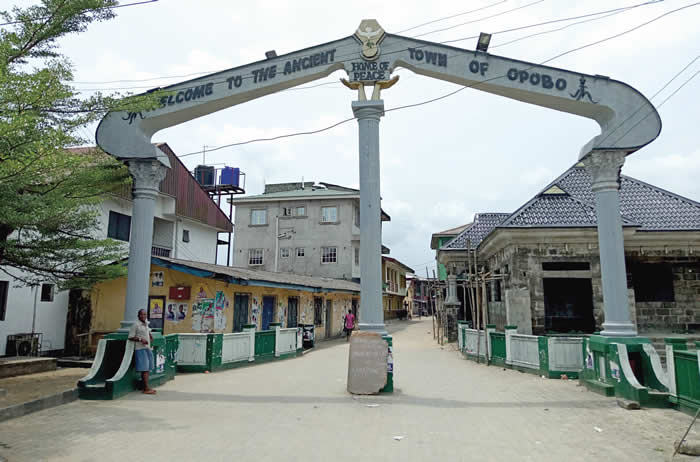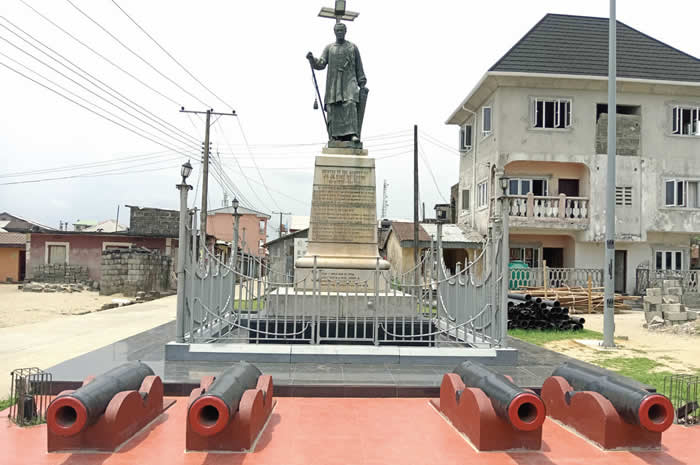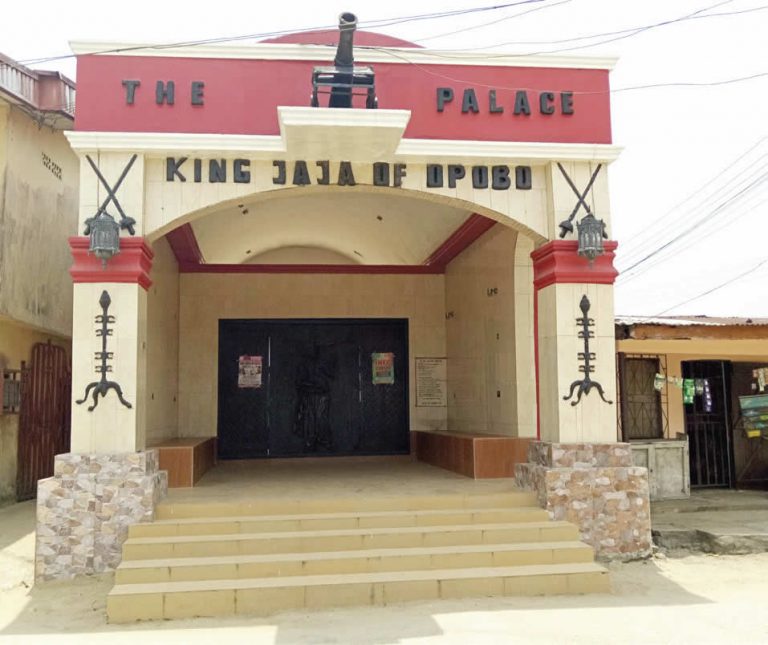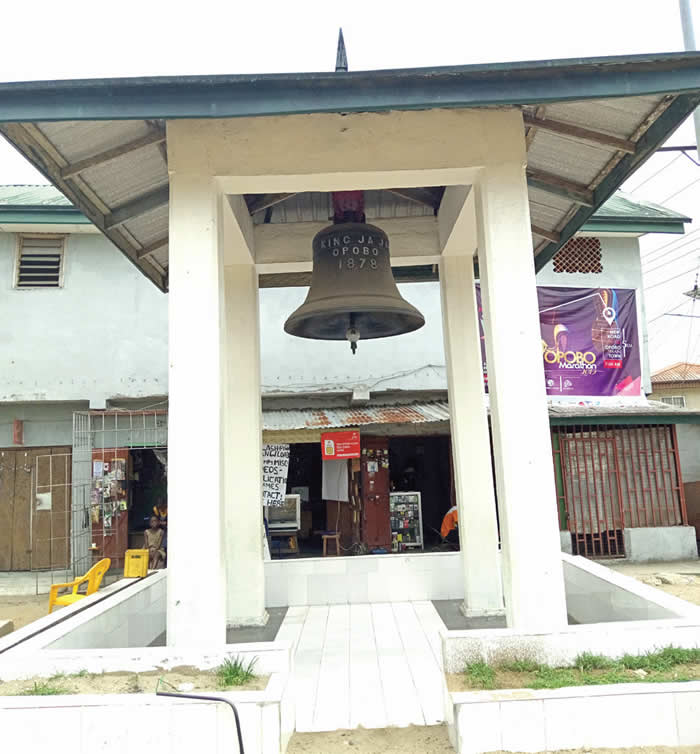
Opobo land
The story has been told of Opobo, the land of the legendary King Jaja where making noise a night is expressly forbidden. Boasting of a rich past and an interesting culture, Opobo, homeland of legendary merchant trader, King Jaja, is a place where taboos soar above several other things, writes ERIC DUMO
The sight of eye-catching multi-storey buildings greet you as you make your way into Opobo town. Whether you decide to come in through the community’s vast but dilapidated jetty or through its newest entry point at the other end, courtesy of an ongoing road project linking the ancient kingdom to the outside world through Nkoror, its nearest neighbours by land, the sight is the same – beautiful structures squeezed into every available space welcomes you into the town.
Until recently when vehicles and motorcycles could go into Opobo from Port Harcourt, Rivers State, or other parts of the country through Bori in Ogoniland and navigating through Nkoror before getting to the community, residents and visitors had to rely on speed boats operating at either Kono waterside in Bori or the jetty at Ikot Abasi, Akwa Ibom State, to get to the town. Apart from the financial burden of such trips on the pockets of the people, the risk they had to contend with while on the sea, made moving in and out of Opobo a difficult task. But the arrival of the road even though it has yet to be completed, has made life a lot easier for people going to the place. It has brought some sort of relief to them.
One of the earliest Nigerian communities to come in contact with Europeans, there are indeed many things that make Opobo a peculiar place. Besides being the homeland of legendary merchant trader – King Jaja – originally known as Jubo Jubogha; the area used to be a vibrant commercial centre in the coastal part of Rivers State and indeed the Niger Delta region, according to history. But beyond that, Opobo is also home to taboos of all kinds – some of them unique to the people of this island community.
Dogs are not allowed in Opobo
A recent visit to the area by our correspondent revealed how its people have lived with several age-long taboos, preserving and transferring the same from generations to generations.

For instance, while in many communities across Nigeria, the presence of dogs is a common feature; in Opobo, such is forbidden. According to findings by our correspondent, the tradition, which has its roots in ancient times, is one of the most important taboos the people of this coastal town hold on to. While the people are free to bring in dog meat to eat in their homes whenever they feel like, they are not allowed to keep dogs as pets or bring such into the community. For those, who flout this grand rule, the penalty is usually grave.
“If there are people who love to eat dog meat, they have to go to Ikot Abasi in Akwa Ibom State to do so. They cannot bring it into this community,” Christian Apiafin, a 71-year-old retired warrant officer of the Nigerian Army, told Saturday PUNCH. “It has been so since the time of our forefathers. We have not allowed dogs into Opobo. We have carried that tradition up to this time.
“In 2015, a former governor of Rivers State, Rotimi Amaechi, mistakenly visited Opobo with sniffer dogs. Everybody was annoyed.
“If it were a less important person, punishment would have been meted out to him on the spot. Instead, we held Dakuku Peterside (current Director-General of the Nigerian Maritime Administration and Safety Agency) and the king of the town responsible and they provided what the town demanded for cleansing.
mportant person, they would have had to provide everything that the town demanded for cleansing on that spot.
“If such a person was discovered by less reasonable individuals, they could be mobbed to death for bringing a dog into Opobo,” he added.
That is not all. In Opobo, one is not allowed to shoot a gun. Also, individuals are forbidden from wearing caps while passing through the gateway linking one compound to another.
The gateways are a small roofed passage, just like a tunnel, connecting one compound to another. On the floor of such gateways is a crossbar, which those passing are forbidden from stepping foot on. According to findings by our correspondent, adhering to this rule while passing through the place is a mark of respect for the chief of a particular compound, which is also referred to as war canoe house.

Flouting any of these rules attracts severe sanctions, Saturday PUNCH learnt.
Making noise at night is forbiden
But while these taboos could be said to hold sway during daytime, other sets of unusual ones rule the land at nighttime. For example, while it is not uncommon to hear giant loud speakers blaring music at hundreds of decibels at night time with a cacophony of voices providing background percussion in other communities; in Opobo, such is totally forbidden. Making any form of noise at night is one of the biggest offences anyone can commit in this island community. You could be labelled an enemy of the town.
It’s taboo to quarrel at nighttime
Similarly, quarrelling and fighting in the night is taboo here as well. Regardless of how provoked you are, you must wait till the break of dawn to vent your anger on whoever has provoked you.
Breaking any of these rules attracts a fine of N7,000 each, according to findings by our correspondent. Failure to pay the fine could incur stiffer punishments, it was also learnt.
Shedding more light on some of these practices in this historic community, head of its traditional and security institution known as Owu Ogbo, Warisenibo Manila, told Saturday PUNCH that many of the taboos had helped ensure sanity across the kingdom over generations.
“We do not joke with our culture and tradition in Opobo,” he began. “For instance, those who bring dogs here are made to pay through their noses. When former Governor Amaechi came in with dogs, those who brought him in were made to pay up to N1.5m for us to appease the land.
“Without cleansing the land, people would experience what they had never seen before. In Opobo, we don’t fight in the night. Once you do that, you’ll be made to pay a fine.
“We don’t make a noise in the night. This is so because it was in the night that our enemies attacked us when we were at Bonny.
“So, to avoid a repeat of the same thing, we do not make a noise at night so that we can hear when our enemies are coming because they mostly attack at night.
“Also, you cannot pound any food or break firewood in the night. Starting from 7pm, you can’t even quarrel. The fine for fighting at night is N7,000 and each person involved will pay the amount.
“This practice has been promoting peace and unity in this community from generation to generation. It is as a result of this that Opobo is one of the most peaceful places in Nigeria today,” he said.
It was however learnt that residents could suspend whatever disagreements they have with one another and resume quarrelling in the morning.
Like most communities in the Niger Delta region where there are different practices governing the transition to womanhood and becoming a ‘certified’ wife; in Opobo, there is an important criteriom a potential bride must fulfil for her to be recognised by other women in the town. Locked in a fattening room for at least one week, depending on the financial strength of the groom and his family, such ladies are equipped with relevant skills on how to keep a happy home by older and more experienced women. Upon coming out from the place, an elaborate ceremony is held to celebrate and usher such bride into womanhood. It is only after fulfilling this condition that such a woman is allowed to tie a wrapper called ‘George’ around her waist. This, according to findings by our correspondent, is like a mark of certification by the entire community.
Without undergoing this process, a woman cannot tie a George wrapper in Opobo and she would be denied many things,” Richard Cookey, a school teacher, told Saturday PUNCH. “If a woman has not fulfilled this aspect of our tradition, there are some places she cannot enter and she cannot freely mix with other women. In fact, she can be disgraced by other women in the community at any time.”
Opobo’s many social and infrastructural needs
But away from the fascinating aspects of its culture and tradition, Opobo has only little to show for its glorious past. Despite being one of the earliest to come in contact with the West, the town has yet to be connected to the national electricity grid. Residents have to rely on the community’s generator that only works between Fridays and Sundays from 6pm to 6am for electricity. Sometimes it is put on for a few hours on Wednesdays as well. Those, who have the capacity, rely on small generators to fulfil their need for electricity.
The town also does not have a bank despite its place in national history. Much of the island’s residents, including its eight satellite villages, estimated at 98,000, mostly have to take a 15-minute boat ride across an expanse of water to Ikot Abasi in Akwa Ibom State to carry out bank transactions.
The satellite villages are Minimah, Higher Minimah, Queens Town, Kalaibiama, Epellama, Iloma, Ekreborokiri and Kalasunju. Though there are a few Point of Sale centres offering such services in Opobo these days, according to findings by our correspondent, many residents still go across the sea to perform such tasks.
Predominantly fishermen, the town is more of a civil service enclave than a vibrant commercial centre that it once was. Apart from relying on menial jobs to survive, many of the community’s young people are forced to travel to distant places to eke out daily living. Its jetty, once the darling of tourists and other categories of visitors has experienced traffic reduction, leaving those, who operate commercial boats to wish for a return to the old times.
“Most of our young people do not have jobs,” Chris Pepple, a 74-year-old retired civil servant, told our correspondent during a chat. “This gives me concern every day.
“Despite the potential we have in Opobo and being among the first people to have contact with the white man, we are lagging behind in several aspects.
“We don’t have any industries here and this is affecting us a lot. Each time I think about this, I become afraid for the future of our young ones,” he stated.
A father of five, Pepple, and dozens of other retired men like him come out to Opobo’s seaside every afternoon to discuss almost everything happening within and beyond the town. It is under the huge trees dotting its coastline that they recall the community’s glorious past and talk about the bleak future that now confronts it.
“In the past, Opobo used to be a very important commercial centre for the riverine communities in this region,” he said as the other elderly men around the place nodded in affirmation. “It was the main place where trading activities took place but over the years, a lot has changed.
“Nowadays, our people have to struggle to put food on their tables because there are really no jobs here. Economically, we are not where we should be. The development visitors expect to see based on Opobo’s fame outside is not the reality here. A lot of them are disappointed when they come here. It hurts me a lot,” he said.

Despite its proximity to water, potable drinking water is still far from the reach of many of the island’s residents. Many homes have to rely on sachet water sold in different shops to satisfy their thirst. Though there is a functional health centre at the place, a handful of dwellers our correspondent interacted with said that most times they have to take the long journey to Akwa Ibom to get medicines to attend to their health needs.
“Recently, my wife fell ill and I was told to buy a particular drug for her, I couldn’t get it in Opobo, I had to go to Akwa Ibom to purchase it at a pharmacy in Ikot Abasi. That is how much we are suffering in this place,” Daminabo Ogolo, a furniture maker, told Saturday PUNCH.
Though still standing at strategic locations across the community, monuments that remind the world of Opobo’s significant past appear to be fast fading away, our correspondent observed during the visit.
A walk to the site of the building where the great King Jaja, founder of the town, once lived showed just how much the community had failed to preserve its rich past. While it may have been impossible to have the entire structure still standing as a result of age, with little restructuring or support in place, most of it could still have been ‘alive’ today. At the moment, only a few iron pillars holding on tightly to fragments of blocks remain of the original building. Opposite it however, is a gleaming one-storey building that now serves as the palace of the incumbent monarch, King Dandison Douglas Jaja (Jeki V).
According to Manila, despite its rich tourism potential, Opobo is making little or nothing from this natural goldmine. He told Saturday PUNCH that the town had nothing to show for its global prominence.
“This town should be making a lot from tourism but unfortunately this is not so,” he said as he stared towards Minimah where Opobo’s last remaining war canoe is said to be kept.
Opobo has a rich culture and history. The town has 14 sections and 67 war canoe houses. Each of these war canoes is fitted with ammunition and can travel to distant places to conquer enemies. Each compound owned one of these boats and they used it to defend the community in times of war.
“But after the civil war, the white people took 66 of the war canoe houses away and paid compensation to each of the houses. There is only one left, it is in Minimah.
“Despite having important monuments that can attract tourists, we are not reaping any benefit from tourism.
“We used to have a boat regatta but it stopped in 2008 due to lack of fund. It attracted lots of participants from other parts of the world.
“If things were done the proper way, Opobo could be making a lot of money from tourism,” he added.
While its potential and the reality on the ground tell two different stories, the arrival of a link road connecting Opobo to other parts of Rivers State appears to have brought a new kind of relief to the people of this island. Already, hotels and other small businesses are springing up, with traders and travellers describing the impact as positive.
“The road has opened up the place for business,” a shop owner at the town’s market, who identified herself only as Mrs Ogechi said.
“The cost of transporting goods has reduced significantly. It has impacted our businesses positively. We hope that as a result of this, industries would come into this community so that the economy can improve.”
Indeed, like Ogechi, a significant boost in economic activities is the prayer and wish on the lips of most residents of this island settlement. They would hope that like its many taboos and fascinating cultural attributes, the fortunes of the town can match the name it has earned in the annals of history. But how soon the area fulfils its potential remains to be seen.
***
Source: Saturday Punch
No comments:
Post a Comment